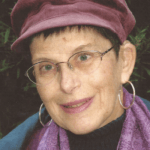
Deena Sortland (Belgium)
I was born on August 22, 1937, in Brussels, Belgium, though my parents had Dutch and Jewish nationalities and we considered ourselves to be from the Netherlands. My parents were Gerard Samuel Zonlight, born in Antwerp, Belgium, and Hanna Blitz, born in Amsterdam, Holland. I was named after my paternal grandmother, though she spelled her name “Dina.” My parents changed the spelling of my name when we arrived in the United States.
My father owned a small advertising firm that sold advertising giveaways such as pencils and pocketknives to businesses all over Western Europe. He was in Austria and witnessed the Anschluss, and reported on it for Dutch or Belgian press.[1] He was in Czechoslovakia before the takeover. He visited Germany and reported what he observed. This, plus the fact that we were Jewish, though not practicing Jews, placed him on the list of enemies to be picked up by the Gestapo.
The Germans invaded Holland, Belgium and France in 1940. My father knew that something horrible was coming so he made sure the family’s passports were up to date and that there was always gas in the car. On May 13, one day before the border with France closed, my parents fled with my brother Martin and me by car to France.
Our extended family agreed that we should meet up somewhere in France, if and when everyone could get there. It took us a while, but eventually we wound up in the Vichy portion of France, in the south, which wasn’t yet occupied. My father had a non-Jewish friend there who owned a hunting lodge, where we were allowed to stay. The whole family gathered there.
There were big decisions to be made, so my father decided to get advice from the Dutch consul in Lyon, France, who recommended that all Dutch Jews get out of Europe immediately while they still could. My father took that advice, though not all of my family decided to leave. My grandfather – my father’s father – Moses Zonligt and his wife, my grandmother, Heintje Zonligt, decided they were not going to go to the United States and were going to go back to Belgium. As far as they knew, the Germans weren’t doing anything too awful. When they got to the French-Swiss border with the help of the underground, my grandfather made a mistake that cost him his life. He was looking out a window and saw a man that he thought was Jewish. The Germans saw my grandfather waving his hand at the man, telling him to go back, and picked him up. He died in Auschwitz. My grandmother, who looked very Dutch, was smuggled over the border and survived.
We lived in Vichy for about a year until we could get immigration visas to the United States. My brother went to school and got a ration card and extra 50 grams of bread per day. I was very weak and my parents asked some relatives to send us vitamins.
We were very lucky because we were able to get visas to cross into Spain from France, and then into Portugal. From Portugal, we were able to get tickets for a steamship to the United States in May 1941. Although the conditions on the ship were not good, my father managed to get extra food for my brother and me.
We were able to get our visas to the United States because my grandfather – my mother’s father – was in the tobacco business and had done well in Holland. He’d started a new life in New York a year earlier, and thanks to his contacts we were able to get to the United States.
We arrived to New York in June 1941. A month later we settled in Salt Lake City, where we lived for about 10 years before going to California. I met my husband Dale Sortland at International House at Berkeley; we got married in August of 1963. We have two children, Stefan and Natanya. I have a Masters degree in history and taught World History and English at schools as well as Girls Glee Clubs. We came to Tucson in June 2004.
[1] Anschluss (German: “joining”, is the term used to describe the annexation of Austria into Nazi Germany on March 12, 1938.
